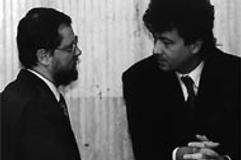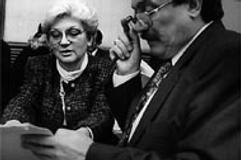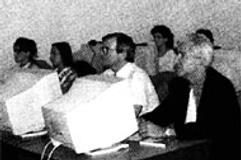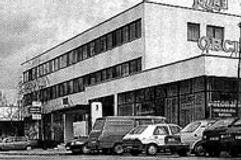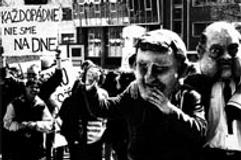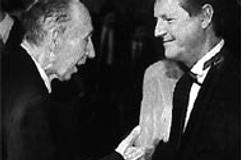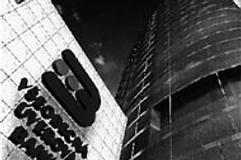Archive of articles - May 1997, page 4
If you desire to read an old article, use the search bar or select the publication date.
NBS satisfied with monetary policy results
The Slovak central bank (NBS) on April 24 said its strict monetary policy measures, imposed gradually since last summer, were now bringing the desired positive results in money supply and credit expansion. "I can say now that the policy measures are working in the way they were designed, they are reducing M2 growth and credit expansion," NBS Governor Vladimír Masár told journalists. The NBS implemented a series of measures last summer to rein in rapidly growing credit expansion which was at the heart of the fast growth in the country's money supply.But some analysts said the bank should be careful about relaxing its policy - at least for the short-term. "The restrictive [monetary] policy finally showed the desired effect on the trade [balance] in the first two months of the year and we expect that favorable development to continue in the first quarter [of 1997]," said Juraj Renčko, an economic analyst at the Slovak Academy of Science.
Cabinet pushes for economic restructuring
The Slovak government will push for changes in the structure of the economy in 1997 to ensure healthier and sustainable economic growth in the future, Finance Minister Sergej Kozlík said on April 24."We will try to pursue changes in the GDP [gross domestic product] structure in 1997, mainly by boosting exports of more sophisticated products with a higher added value and reducing expensive and unprofitable imports," Kozlík told an economic issues roundtable organized by the Economist Group in Bratislava.Kozlík said the process, which will require financing from both domestic and foreign sources, should help the economy achieve a healthier structure in the long term.
Tiny studios becoming popular
Bratislava's pathetically low number of available apartments is matched only by their distressingly low quality. This dearth of supply, combined with a trend to prefer owning a niche instead of renting one, has prospective flat-owners climbing over each other to pay relatively high prices for niche-like new apartments.As a result, new projects featuring one-room studio apartments are becoming more popular among developers. One such development 10 kilometers east of downtown in the district of Vrakuňa is selling 27.3 square meter-apartments for 600,000 Sk ($19,000).Although not to be completed until late next year, about 40 percent of the 70 studios in the Vrakuňa development have already been sold and another 20 percent are in negotiations, according to Blažej Ďurža of the selling agency Novobyt.
Kováč blames attorney general with corrupting justice
In a lone crusade pointing out what he says is corruption in the Slovak justice system, Slovak President Michal Kováč on April 17 publicly pistol-whipped the country's attorney general, Michal Vaľo, in a report alleging high-level obstruction of 26 unsolved Slovak criminal investigations.Speaking at a press conference on the day the report was released, Kováč said the report documents every criminal investigation, in the young republic's history, in which key evidence supports the possibility that Slovak government officials had tampered with the legal process. Kováč furthermore laid the blame for any wrongdoing directly at the feet of the attorney general.
Slovak Gas Company 4 billion Sk short for planned investments despite huge profit
The largest profit maker in Slovakia over the last four years, Slovenský Plynárenský Priemysel (Slovak Gas Company - SPP), almost doubled the profit (13.3 billion Sk in 1995, $460 million) of the next closest firm, Slovenské Elektrárne (7.4 billion Sk, $246 million).Times look even better, as the Slovak gas giant signed a deal guaranteeing its receipt for the next five years from its long-time source, Russia. The pact penned during the April 24-25 visit by Russian Prime Minister Victor Chernomyrdin, whose career rose through the Russian gas company Gazprom, SPP seems set on continuing its steady rise in profit. Gazprom provides Slovakia with 98 percent of its domestic natural gas needs, six billion cubic meters in 1995.
More companies are dusting off their computers and training their workforce
Scenario 1: Imagine a large firm with a room full of the most advanced computers to date, but they're sitting in boxes gathering dust.Scenario 2: A Slovak bank acquires a European Union Phare grant to modernize its equipment. Employees stare in awe at the slick hardware, fancy computer tables with sliding drawers for the keyboard and mouse as well as spiffy monitors displaying Microsoft software. But there's a hitch: their training to date enables them to use one percent of this new technology.
Office supplies vendor zeros in on responsiveness
Like many companies operating before 1989, the office furniture and warehouse supplies' producer and distributor OZAP enjoyed a monopoly as a supplier to various outlets and factory furnishers in the former Czechoslovakia. With the advent of the market economy, though, the company started to rapidly lose its position on the market. But a joint venture in 1995 changed all that, as OZAP partnered with the Swedish company AJ Produkter, one of the biggest European catalog furniture vendors, to form AJ OZAP.The alliance proved to be a vital injection. In two years, the company has doubled its turnover, from 60 million Sk in the first 9 months of the joint venture's operation to 120 million Sk in 1996, and is probably heading for yet another increase this year, according to Zuzana Kormanová, the company's executive director. Kormanová added that AJ OZAP's total revenue this year is expected to exceed 150 million Sk.
Feeling shunned by NATO, Mečiar looks east
After spending seven years on a sometimes bumpy road of integration into NATO, Slovakia may be taking a loop back. Now that Slovak Prime Minister Vladimír Mečiar believes his country has gotten a red light from NATO, he seems intent on shunting Slovakia onto a track with a green light although it leads to the country's red past.At least that's what many opposition leaders see from Russian Premier Viktor Chernomyrdin's April 24-25 visit to Slovakia. "We are worried that [the visit] will be utilized by Mečiar's government to further accomplish the strategy of turning towards the East after the West clearly expressed that it doesn't want us," said Ivan Mikloš, vice-chairman of the Democratic Party.
Slovak economy's fate in the hands of a few giants
Slovak exports, which make up some 60 percent of the country's gross domestic product (GDP), are still generated by a handful of large companies despite seven years of economic transformation. The large concentration of exports from top industrial firms decreases diversity and effectiveness and puts the Slovak economy in an inflexible position according to Peter Mihók, president of the Slovak Chamber of Commerce (SOPK).Exports rose only six percent in 1996 compared to 1995, while it increased 19 percent in 1995 and 28 percent in 1994."Even though statistics show that some 20,000 companies participate in foreign trade, the strongest fifty create up to 80 percent of all exports and imports," said Mihók.
VÚB satisfied despite lower profits
Gross profit at Všeobecná Úverová Banka (VÚB) a.s., Slovakia's largest commercial bank, fell sharply in 1996, but bank officials said on May 2 they were satisfied with the result because it included heavy provisioning for its loan portfolio.VÚB officials said its pre-tax profit fell to 79.6 million Sk in 1996 from 2.91 billion Sk profit in 1995, as it created some 1.5 billion Sk in reserves for classified loans. "We consider the result satisfactory since our main priority was to continue the restructuring of our loan portfolio," VÚB Vice-President Dušan Paulík told a news conference after the bank's annual general meeting. "The planned pre-tax profit was some 75 million crowns, so the final figure was fully in line with our policy which has a target to decrease the deficit of sources for covering risky assets," Paulík continued, adding the bank still needed to create reserves of 7.8 billion Sk.
Zlatého Orla - Almost, but not quite
Clearly Zlatého Orla (the Golden Eagle) has set its sights on being one of the finer restaurants in Bratislava, and equally clear is that it has the potential to be one. We are intrigued to see if this will happen. We hope it will, but it's not there yet. Great strides have been made since our earlier visit shortly after the restaurant opened. We noticed major improvements, particularly in the attitude of the staff.The restaurant has many things going for it - the location is wonderful, on one of the main walkways in Staré Mesto (Old Town), next to the British Embassy, not far from the opera, symphony and Hotel Danube. The entrance is attractive, at the end of a small arcade. The layout and decor are quite delightful - one enters into a well-lit bar area that is simple, clean and with attractive furnishings - basically a place where it appears ideal to conduct a quiet meeting over cocktails.
VSŽ among few stocks still attracting foreign investors
The bearish mood continued on the BCPB floor market during the second half of April, with no impetus in sight to change this situation. Recent political events including confirmation that Slovakia will be eliminated from the first group of central European countries invited to join NATO and the apparent reorientation of the country towards Russia during Russian Prime Minister Viktor Chernomyrdin's visit to Slovakia together with weak 1996 corporate results will likely further deter potential investors.The recent short-term government measure dealing with import deposits aimed at decreasing imports and prepared measures which should protect domestic producers, increase exports and tighten fiscal discipline probably will not help the capital market either. Unlike the Czech Republic, the government refused to discuss establishing an independent Securities and Exchange Commission. However, export support measures could provide an advantage to companies with Russian market links, such as VSŽ and Chirana-Prema.
Slovakia hosts Czech Republic in vital football match
Anytime the Slovaks meet the Czechs in a sporting event, there is sure to be high drama. In football they have only met once that being two years ago in a friendly in Prague that ended in a 1-1 tie. They will face off again in a much more important match on May 21, at 6 p.m., at the 25,000 seat Slovan football stadium in Bratislava. The game is part of the qualification round for World Cup '98 to be held in France. Each country plays the other teams in their pool in both home and away matches. The top two teams will most likely advance to the World Cup.Slovak players to watch are: striker Peter Dubovský (plays for 1st division club Real Oviedo in Spain), who has explosive offensive potential, mid-fielder Ľubomir Moravčik (plays for 1st division club Bastia in France), who hustles after every ball, goal keeper Alexander Vencel (plays for 1st division club Strasbourg in France), who at times makes spectacular saves and, defender Dušan Tittel (plays for 1st division club Slovan, Bratislava), who provides solid defense.
Slovnaft reports lower '96 results than forecast
Rising world crude oil prices and a plant closure for general maintenance, as expected, bit hard into Slovak refiner Slovnaft's bottom line in 1996, company officials said. Slovnaft, the country's sole crude oil refiner, said its 1996 net profit was 1.29 billion Sk, down some 30 percent from its 1995 result of 1.83 billion Sk.Presenting the results at a general shareholders' meeting on April 24, Slovnaft Director Slavomír Hatina said the figures were still positive despite the drop in profits, given average world crude oil prices were about 50 percent higher than the previous year."A constant rise in world oil prices was a reasonable problem [during 1996], and resulted in rising costs for crude oil by more than four billion crowns, or 23 percent more than 1995," Hatina said. "On the other hand, we did not calculate this increase completely into the prices of our products, mainly motor fuels."
- 3 free things to do in Bratislava in the next seven days
- Weekend: What to make of Easter in Slovakia
- US giant pulls plug on Slovak factory, axing 137 jobs
- News digest: Finns air unseen video of Fico shooting, PM’s bloody jacket driven away by minister
- Syrian about to finally finish hotel in Bratislava started 17 years ago
- When to shop over Easter: Opening hours for supermarkets in Slovakia
- Hundreds of people ousted from Bratislava’s Volkswagen
- Slovakia's latest basketball star is destined for great things in the USA
- 3 free things to do in Bratislava in the next seven days
- Hundreds of people ousted from Bratislava’s Volkswagen
- Weekend: What to make of Easter in Slovakia
- News digest: Finns air unseen video of Fico shooting, PM’s bloody jacket driven away by minister
- US giant pulls plug on Slovak factory, axing 137 jobs
- When to shop over Easter: Opening hours for supermarkets in Slovakia
- He said he wanted a guitar and ran away. About the time a famous NHL team picked up an unknown Slovak
- Prices surge in Slovakia as inflation hits 15-month high
- “Return not,” the ocean cried. But I returned for her
- Hundreds of people ousted from Bratislava’s Volkswagen
- US giant pulls plug on Slovak factory, axing 137 jobs
- 3 free things to do in Bratislava in the next seven days
- Prices surge in Slovakia as inflation hits 15-month high
- When to shop over Easter: Opening hours for supermarkets in Slovakia
- Weekend: What to make of Easter in Slovakia
- Cockroaches and crumbling toilets greet seven-year-old battling serious virus
- A café in an ice cellar, sand dunes and a flower shop at the border
- “Return not,” the ocean cried. But I returned for her
- German shoemaker Lowa joins wave of factory closures in Slovakia
- Hollywood turns Slovak highlands into high-speed playground Video
- Chicken Jockey! Chicken Jockey! Chicken Jockey! Video
- Hundreds of people ousted from Bratislava’s Volkswagen
- Danish shoemaker to shut Slovak factory, axing 650 jobs in fresh blow to struggling region
- Prices surge in Slovakia as inflation hits 15-month high
- Water supply to be cut in parts of Bratislava’s Old Town in late April
- Slovakia's latest basketball star is destined for great things in the USA
- News digest: Finns air unseen video of Fico shooting, PM’s bloody jacket driven away by minister
- 3 free things to do in Bratislava in the next seven days
- He has been disciplined for delays. Now he will lead Slovakia’s top court
- Slovak startup Upfan declares war on fake tickets
- Smer MEP tells Slovaks to learn the EU’s rules – so they can break free from Brussels
- Too small to cope alone, Slovak villages are teaming up More articles ›



